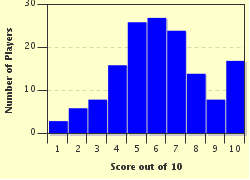Quiz Answer Key and Fun Facts
1. The first mention of the word 'everything' in the NKJV Bible is Genesis 1:25. The verse states: "And God made the beast of the earth according to its kind, cattle according to its kind, and everything that creeps on the earth according to its kind. And God saw that it was good." According to Scripture what day was it when God made the beast of the earth?
2. After Genesis 1, the word 'everything' in the NKJV appears next in Genesis 6:17. The verse tells of the LORD proclaiming news of a massive flood which would engulf the world: "And behold, I Myself am bringing floodwaters on the earth, to destroy from under heaven all flesh in which is the breath of life; everything that is on the earth shall die." According to Scripture, the LORD revealed plans for the flood to Noah and, of all people, only he and his wife survived.
3. 1 Kings 14:26 tells of a ruler taking 'everything' from the house of the LORD and the king's house. The verse in the NKJV states: "And he took away the treasures of the house of the LORD and the treasures of the king's house; he took away everything. He also took away all the gold shields which Solomon had made." Scripture goes on to tell of the Israelite king replacing Solomon's gold shields with ones made of bronze. Who was the grand thief who took 'everything?'
4. One of the verses in the Hebrew Bible, or the Old Testament of the English Bible, that contains the word 'everything' is part of a modern folk song. The first verse goes like this: "To everything there is a season, a time for every purpose under heaven." What book contains the verse?
5. The following verse containing the word 'everything' is from Nehemiah 9:6 in the NKJV: "You alone are the LORD; You have made heaven, the heaven of heavens, with all their host, the earth and everything on it, the seas and all that is in them, and You preserve them all. The host of heaven worships You." True or false: The statement was made by eight Levites -- Jeshua, Kadmiel, Bani, Hashabniah, Sherebiah, Hodijah, Shebaniah, and Pethahiahsde.
6. The following verse, containing the word 'everything,' is from Psalm 69:34 in the NKJV: "Let heaven and earth praise Him, the seas and everything that moves in them." Out of the four options below, who is generally credited with writing a large number of the Psalms?
7. Acts 17:24, in the NKJV, tells of Paul making the following statement to a group of people: "God, who made the world and everything in it, since He is Lord of heaven and earth, does not dwell in temples made with hands." Where was Paul when he made the statement? (Hint: He was in a city where there was an altar constructed in honor to an unknown god.)
8. 1 Corinthians 1:5, in the NKJV, contains the word 'everything'. Can you complete the missing word from the passage? "...that you were enriched in everything by Him in all utterance and all _________."
9. The following verse, containing the word 'everything', is from 2 Corinthians 8:7, as per the NKJV: "But as you abound in everything -- in faith, in speech, in knowledge, in all diligence, and in your love for us -- see that you abound in this grace also." What is the additional grace the Corinthians were told to abound in?
10. The following verse, containing the word 'everything', is from 1 Thessalonians 5:18 in the NKJV: "...in everything give thanks; for this is the will of God in Christ Jesus for you." Who is widely accepted as the author of 1 Thessalonians?
Source: Author
Cowrofl
This quiz was reviewed by FunTrivia editor
CellarDoor before going online.
Any errors found in FunTrivia content are routinely corrected through our feedback system.

